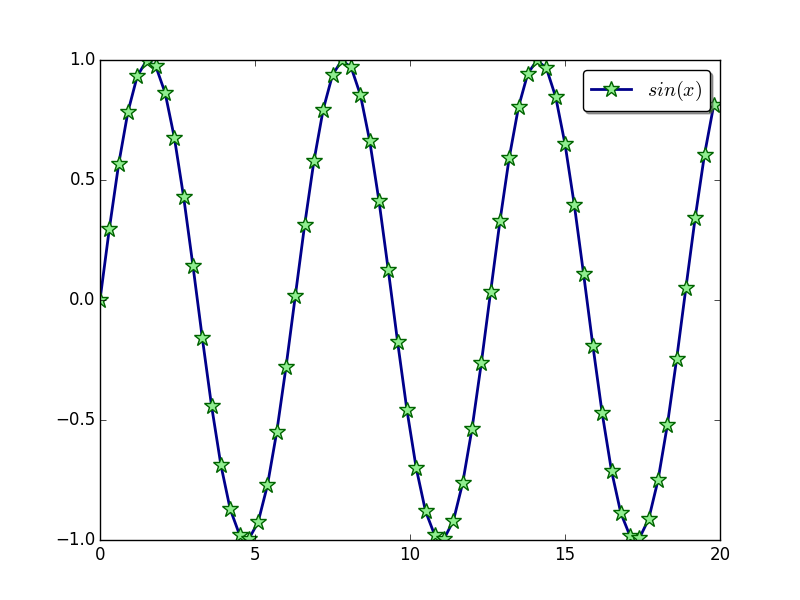Matplotlib中Legend怎么设置到坐标轴外侧
Posted on 12 Nov 2014 MatplotlibPythonTutorial 添加评论 Matplotlib的Legend和Matlab很像,但是没有选项可以直接将Legend放置到坐标轴外侧。默认的定位选项loc有以下选项:
Matplotlib的Legend和Matlab很像,但是没有选项可以直接将Legend放置到坐标轴外侧。默认的定位选项loc有以下选项:
loc : int or string or pair of floats, default: 0
The location of the legend. Possible codes are:
=============== =============
Location String Location Code
=============== =============
'best' 0
'upper right' 1
'upper left' 2
'lower left' 3
'lower right' 4
'right' 5
'center left' 6
'center right' 7
'lower center' 8
'upper center' 9
'center' 10
=============== =============
Alternatively can be a 2-tuple giving ``x, y`` of the lower-left
corner of the legend in axes coordinates (in which case
``bbox_to_anchor`` will be ignored).
所以,结论是你要么把Legend放在坐标轴区域内,要么直接给定坐标。那么怎么把Legend放到坐标轴外呢,答案是没有直接的好办法,这里提供一个凑活能使的方案。需要用到Legend函数的一个选项:
bbox_to_anchor : :class:`matplotlib.transforms.BboxBase` instance or tuple of floats
Specify any arbitrary location for the legend in `bbox_transform`
coordinates (default Axes coordinates).
For example, to put the legend's upper right hand corner in the
center of the axes the following keywords can be used::
loc='upper right', bbox_to_anchor=(0.5, 0.5)
用法并不复杂,设置一个Legend在bbox坐标下的位置,然后配合参数使用。什么是bbox呢?这个可以理解成坐标轴区域是(0,1)的一个坐标系。那么放在坐标轴外面就是大于1的值了。
看起来不错哦,不过直接放置到坐标轴之外也会直接放置到绘图区外了,所以需要先调整坐标轴在绘图区的位置,这也就是为什么说这个解决方案不那么理想的原因啦!那怎么调节坐标轴的大小呢?那只好去翻Axes的手册了,然后你可能会找到下面这个函数
Definition: ax.set_position(self, pos, which=u'both')
Docstring:
Set the axes position with::
pos = [left, bottom, width, height]
in relative 0,1 coords, or *pos* can be a
:class:`~matplotlib.transforms.Bbox`
这样这个工作就越来越像Matlab中的高级绘图控制了,很遗憾好像你必须那么做。
缩放好之后你就可以用bbox_to_anchor函数把Legend放置到需要的位置了。有点抽象啊,给个例子吧!
# -*- coding: utf-8 -*-
"""
Created on Wed Nov 12 10:27:22 2014
@author: longqi
"""
from pylab import *
x = arange(0,20,.3)
y = sin(x)
plot(x,y,'darkblue',lw=2,marker='*',mfc='lightgreen',ms=12,mec='darkgreen',mew=1)
legend(['$sin(x)$'])
figure()
plot(x,y,'darkblue',lw=2,marker='*',mfc='lightgreen',ms=12,mec='darkgreen',mew=1)
legend(['$sin(x)$'],3)
figure()
plot(x,y,'darkblue',lw=2,marker='*',mfc='lightgreen',ms=12,mec='darkgreen',mew=1)
legend(['$sin(x)$'],bbox_to_anchor=(0.5,0.5),loc=10)
figure()
plot(x,y,'darkblue',lw=2,marker='*',mfc='lightgreen',ms=12,mec='darkgreen',mew=1)
legend(['$sin(x)$'],bbox_to_anchor=(1.02,0.8),loc='center left')
figure()
ax = gca()
ax.set_position([0,0,0.8,1])
plot(x,y,'darkblue',lw=2,marker='*',mfc='lightgreen',ms=12,mec='darkgreen',mew=1)
legend(['$sin(x)$'],bbox_to_anchor=(1.02,0.8),loc='center left')
代码中展示了一下plot函数中众多选项中的一部分,legend函数的其他有用选项比如可以这样控制legend的样式:
figure()
plot(x,y,'darkblue',lw=2,marker='*',mfc='lightgreen',ms=12,mec='darkgreen',mew=1)
legend(['$sin(x)$'],loc='best',fancybox=True,shadow=True,numpoints=1,)
总之,Matplotlib用于2D绘图还是比较优秀的,图像的效果一般来讲和Matlab的图像有过之而无不及。不过有些功能却不太容易实现,还需要大家不断的探索解决方案。
